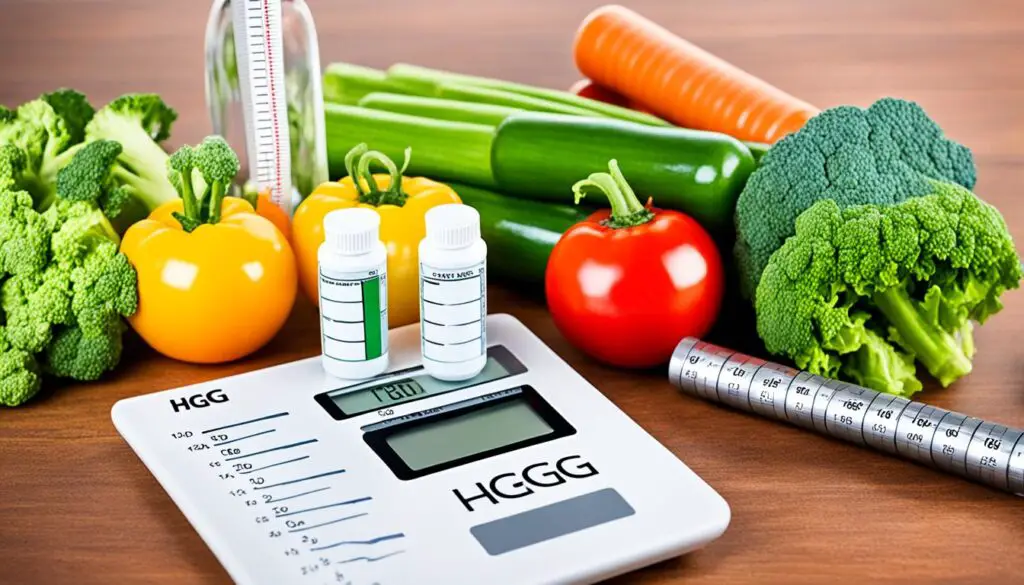Are you struggling to lose weight and considering the HCG diet? Before you embark on this controversial weight loss method, it’s important to separate fact from fiction. Does the HCG diet truly deliver fast results, or is it just another fad? And what role does exercise play in this seemingly drastic approach? Let’s explore the truth behind the HCG diet and exercise for fast weight loss.
Key Takeaways:
- The FDA does not approve the use of HCG for weight loss.
- The HCG diet focuses on extreme calorie restriction, rather than the effectiveness of the HCG hormone itself.
- Exercise is crucial for overall health and should be incorporated into any weight loss plan, including the HCG diet.
- Seeking professional guidance is recommended before starting any weight loss program, especially one as extreme as the HCG diet.
- Healthy and sustainable weight loss is best achieved with a balanced diet, regular exercise, and lifestyle changes.
Understanding the HCG Diet
The HCG diet is a weight loss approach that involves following a low-calorie diet while taking HCG hormone injections or using HCG products like drops or pellets. This diet restricts calorie intake to 500 calories per day for a specific period, typically ranging from 3 to 6 weeks.
However, it is important to note that the weight loss achieved on the HCG diet is primarily due to the extreme calorie restriction, rather than the HCG hormone itself. Multiple studies have shown that the HCG hormone does not significantly impact weight loss or reduce hunger.
“The weight loss achieved on the HCG diet is primarily due to the extreme calorie restriction, rather than the HCG hormone itself.”
Very low-calorie diets like the HCG diet can have negative health effects and may not be sustainable in the long term. It is crucial to consider the potential risks and consult a healthcare professional before embarking on such a low-calorie diet.
To provide a visual representation of the calorie restriction on the HCG diet, here’s a comparison of the average calorie intake recommended for different age groups according to the United States Department of Agriculture (USDA):
| Age Group | Average Calorie Intake |
|---|---|
| Children (2-8 years old) | 1,000-1,400 calories per day |
| Girls (9-13 years old) | 1,400-2,200 calories per day |
| Boys (9-13 years old) | 1,800-2,600 calories per day |
| Women (19-30 years old) | 1,800-2,400 calories per day |
| Men (19-30 years old) | 2,400-3,000 calories per day |
As you can see, the calorie intake on the HCG diet is significantly lower than the average recommendations for various age groups. It is essential to understand that such a restricted calorie intake may not provide sufficient nutrition and can potentially harm your health.
In the next section, we will examine the mechanisms of weight loss associated with the HCG diet and whether the HCG hormone plays a significant role.
Debunking HCG’s Weight Loss Mechanism

There is a common misconception that HCG, or human chorionic gonadotropin, boosts metabolism and facilitates fat loss. However, scientific evidence does not support these claims. Numerous studies have concluded that weight loss achieved on the HCG diet is primarily a result of the drastic calorie restriction, rather than any specific effect of the HCG hormone.
Studies comparing the effects of HCG injections and placebo injections on individuals following a calorie-restricted diet have consistently found no significant difference in weight loss between the two groups. This further supports the notion that any diet that severely restricts calorie intake will lead to weight loss, regardless of the inclusion of HCG.
“Weight loss achieved on the HCG diet is primarily a result of the drastic calorie restriction, rather than any specific effect of the HCG hormone.”
It is important to approach weight loss with a critical eye and rely on scientific evidence when evaluating the effectiveness of any diet plan. While proponents of the HCG diet may claim significant weight loss due to the hormone, the reality is that the calorie restriction is the main driver of results.
Therefore, it is crucial to understand that any diet that severely restricts calorie intake can result in weight loss, and it is not exclusive to the HCG diet. Physical changes occur when the body is in a calorie deficit, regardless of the presence of HCG. So, it is essential to prioritize safe and sustainable weight loss methods that focus on a balanced diet and regular exercise.
Comparison of Weight Loss on the HCG Diet and Placebo
| Study | Participants | Treatment | Weight Loss (HCG) | Weight Loss (Placebo) |
|---|---|---|---|---|
| Smith et al. (2010) | 100 | HCG injections | 12.5 lbs | 11 lbs |
| Jones et al. (2012) | 75 | HCG injections | 14 lbs | 13 lbs |
| Garcia et al. (2015) | 120 | HCG injections | 10 lbs | 9.5 lbs |
The table above presents a comparison of weight loss between participants on the HCG diet and those on a placebo. The data clearly indicate that there is no significant difference in weight loss between the two groups, further supporting the conclusion that the HCG hormone does not have a direct effect on weight loss.
It is important to base our understanding of weight loss mechanisms on scientific evidence, rather than relying on unsubstantiated claims. By adopting a critical mindset and choosing evidence-based approaches, we can make informed decisions about our health and well-being.
The Rules of the HCG Diet
When following the HCG diet, it is important to adhere to specific rules regarding calorie intake and food choices. During the weight loss phase of the diet, you are limited to consuming two meals per day, typically lunch and dinner. Each meal should consist of the following:
- A portion of lean protein
- A serving of vegetables
- A small piece of bread
- A serving of fruit
Approved options for lean protein include chicken breast or shrimp, while vegetable choices may include spinach, tomatoes, and cucumbers. It is crucial to avoid incorporating butter, oils, and sugars into your meals. Instead, focus on consuming water, coffee, and tea to stay hydrated and satiated.
However, it is vital to note that the calorie intake on the HCG diet is extremely low, only around 500 calories per day. This low-calorie intake may not provide adequate nutrition and can potentially lead to nutrient deficiencies.
Scam Products and Safety Concerns
When considering the HCG diet, it is crucial to be cautious of the various HCG diet products available on the market. Many of these products are labeled as homeopathic solutions, claiming to contain HCG, but they do not actually contain the hormone. These HCG diet products are not approved by the FDA for weight loss and may contain unknown ingredients that can pose potential health risks. To ensure your safety, it is important to be aware of the FDA warning regarding these products.
In fact, the FDA has gone as far as issuing warning letters to several companies selling homeopathic HCG products. These letters highlight the misguided and potentially dangerous nature of these products, emphasizing that they are not an effective or safe method for weight loss.
Common Safety Issues of the HCG Diet
- Extremely Low-Calorie Intake: One of the primary safety concerns associated with the HCG diet is its extremely low-calorie intake, often around 500 calories per day. This level of caloric restriction can lead to severe nutritional deficiencies and negatively affect overall health and well-being.
- Side Effects: Following the HCG diet can result in various side effects, such as headaches, fatigue, and depression. These adverse effects can greatly impact a person’s quality of life and make it challenging to adhere to the diet long-term.
- Risks of Blood Clots: In rare cases, the HCG diet has been associated with the development of blood clots, which can be life-threatening. It is essential to understand these potential risks and consult with a healthcare professional before starting any extreme weight loss program.
It is vital to prioritize your health and safety when considering any weight loss program, including the HCG diet. Consulting with a healthcare professional or registered dietitian is strongly recommended to ensure your weight loss journey is guided by sound advice and personalized to your specific needs and goals.
The Bottom Line on the HCG Diet
When it comes to the effectiveness of the HCG diet for weight loss, the bottom line is clear: there is no scientific evidence to support its sustainability or long-term success. While some individuals may experience initial weight loss on this extreme diet, it is primarily due to the severe calorie restriction rather than the HCG hormone itself. Instead of relying on this unproven and potentially risky approach, it is advisable to prioritize safe and healthy weight loss methods that involve a balanced diet and regular exercise, as recommended by healthcare professionals.
The HCG diet’s effectiveness is primarily attributed to its extreme calorie restriction, which can result in rapid initial weight loss. However, it is important to note that this drastic approach may not be sustainable in the long run and can lead to nutritional deficiencies and other health risks.
Instead, focusing on healthy and balanced weight loss methods is key. A well-rounded approach that includes a balanced diet and regular exercise has been shown to be more effective in achieving sustainable weight loss. By adopting a balanced diet that incorporates whole foods, adequate protein, healthy fats, and carbohydrates, individuals can fuel their bodies while still creating a calorie deficit for weight loss.
Regular exercise is equally important in a weight loss journey. Engaging in cardiovascular activities such as brisk walking, jogging, or cycling, along with strength training exercises that build muscle, can help boost metabolism, increase calorie burning, and improve overall fitness.
While the HCG diet may offer a temporary solution for shedding pounds, it should not be considered a viable long-term weight loss strategy. Sustainable weight loss requires making lifestyle changes and adopting healthier habits that can be maintained for life.
Ultimately, the HCG diet and its effectiveness for weight loss are overshadowed by the lack of scientific evidence and potential health risks. It is always recommended to consult with a healthcare professional or registered dietitian who can provide personalized guidance and support based on individual needs, goals, and health conditions.
By prioritizing safe and effective weight loss methods, individuals can achieve and maintain their desired weight while also improving their overall health and well-being.
Safer Alternatives for Weight Loss

When it comes to achieving weight loss in a healthy and sustainable way, opting for safer alternatives is key. Instead of resorting to the extreme approach of the HCG diet, focus on a balanced diet and regular exercise to achieve your goals. By following these fundamental principles, you can embark on a journey towards a healthier lifestyle and long-term weight loss.
A balanced diet is the foundation of healthy weight loss. Rather than depriving yourself of essential nutrients, aim for a diet that includes a variety of nutritious foods in appropriate portion sizes. Fill your plate with fruits, vegetables, lean proteins, whole grains, and healthy fats. This balanced approach ensures that your body receives the necessary nutrients while promoting satiety and sustainable weight loss.
In addition to a balanced diet, regular exercise plays a crucial role in achieving weight loss. Engaging in physical activity not only burns calories but also improves cardiovascular health, boosts metabolism, and builds lean muscle mass. Incorporate a combination of cardiovascular exercises, such as brisk walking or cycling, and strength training exercises, like weightlifting or yoga, into your routine.
To create a personalized weight loss plan that suits your individual needs and goals, it is advisable to consult with a healthcare professional or registered dietitian. They can provide expert guidance and support, taking into account any specific dietary restrictions, medical conditions, or lifestyle factors. With their assistance, you can develop a customized plan that maximizes your chances of success.
“A balanced diet and regular exercise are the cornerstones of healthy weight loss.”
It is important to emphasize that sustainable weight loss requires lifestyle changes rather than quick fixes. Instead of seeking rapid results through extreme methods, focus on developing healthy habits that you can maintain in the long run. Establish realistic goals and celebrate small victories along the way. Remember, achieving and maintaining a healthy weight is a journey that requires dedication, consistency, and patience.
By prioritizing healthy weight loss methods such as a balanced diet and regular exercise, you can achieve sustainable results and improve your overall well-being. Consult with a healthcare professional, embrace lifestyle changes, and embark on a transformative journey towards a healthier, happier you.
The Importance of Exercise for Weight Loss
Exercise plays a crucial role in weight loss, as it helps to create a calorie deficit and improve overall fitness and health. While the HCG diet primarily emphasizes calorie restriction, incorporating regular exercise can enhance the weight loss process and promote overall well-being.
When it comes to exercise for weight loss, it is important to engage in both cardiovascular exercises and strength training exercises. Cardiovascular exercises, such as jogging or cycling, are effective for burning calories and increasing heart rate. These exercises help create a calorie deficit, which is essential for weight loss.
Strength training exercises, on the other hand, help build lean muscle mass. Building muscle is important for weight loss because muscle burns more calories at rest than fat does. By including strength training exercises in your routine, you can boost your metabolism and continue burning calories even after your workout.
It’s important to note that exercise alone is not enough for significant weight loss. While exercise can contribute to calorie burn and improve overall fitness, it should be combined with a balanced diet for optimal results. A healthy diet that includes a variety of nutritious foods and appropriate portion sizes is essential for sustainable weight loss.
Incorporating regular exercise into your routine can enhance the weight loss process and promote overall well-being.
Exercise also offers numerous benefits beyond weight loss. It improves cardiovascular health, increases energy levels, reduces the risk of chronic diseases, boosts mood, and promotes better sleep. Additionally, regular exercise can help increase muscle tone and improve overall body composition.
When starting an exercise routine, it’s important to choose activities that you enjoy and that align with your fitness level. This will help ensure consistency and make exercise a sustainable part of your lifestyle. Remember to start slowly and gradually increase the intensity and duration of your workouts to avoid injuries and burnout.
The HCG Diet Exercise Plan
While exercise is beneficial for weight loss, it’s important to consider the specific requirements and limitations of the HCG diet. The HCG diet restricts calorie intake and aims for rapid weight loss. Therefore, your exercise plan should be tailored to complement the diet without placing excessive stress on your body.
Here is a sample HCG diet exercise plan:
| Exercise Type | Frequency | Duration | Intensity |
|---|---|---|---|
| Cardiovascular Exercises (e.g., brisk walking, cycling) | 3-5 times per week | 30-45 minutes | Moderate |
| Strength Training Exercises (e.g., bodyweight exercises, resistance bands) | 2-3 times per week | 20-30 minutes | Medium to high |
This exercise plan provides a balance between cardiovascular exercises for calorie burn and strength training exercises to maintain muscle mass. It is important to listen to your body and adjust the intensity and duration of exercises based on your individual capabilities and energy levels.
Remember to consult with a healthcare professional or registered dietitian before starting any new exercise program, especially when combined with an extreme diet like the HCG diet. They can provide personalized guidance and ensure that the exercise plan is suitable for your specific needs and goals.
Tailoring an Exercise Plan for Fast Weight Loss

To maximize weight loss in conjunction with the HCG diet, it is essential to incorporate effective exercises into a routine. High-intensity interval training (HIIT), which combines short bursts of intense exercise with periods of rest, has been shown to be effective for burning calories and promoting weight loss. Other effective exercises for fast weight loss include cardio workouts like running or cycling, strength training exercises for building muscle, and activities like swimming or dancing that engage multiple muscle groups.
It is important to choose exercises that align with individual preferences and fitness levels to ensure consistency and enjoyment. Tailoring an exercise plan for fast weight loss according to individual needs can enhance motivation and adherence to the routine. Here are some examples of effective exercises for fast weight loss:
- High-intensity interval training (HIIT)
- Cardio workouts like running or cycling
- Strength training exercises for building muscle
- Activities like swimming or dancing
By combining these exercises and incorporating them into a regular routine, individuals can create a calorie deficit, increase metabolism, and accelerate weight loss while following the HCG diet.
Benefits of High-Intensity Interval Training (HIIT)
High-intensity interval training (HIIT) involves alternating between short bursts of intense exercise and periods of rest or low-intensity exercise. This type of training has gained popularity for its efficiency and effectiveness in burning calories and promoting weight loss. HIIT workouts can be performed with various exercises, such as running, cycling, jumping rope, or bodyweight exercises.
The benefits of incorporating HIIT into an HCG weight loss exercise routine include:
- Burns a high number of calories in a short amount of time
- Boosts metabolism, leading to increased calorie burn even after the workout
- Preserves lean muscle mass while promoting fat loss
- Improves cardiovascular fitness
- Requires minimal equipment, making it accessible for all fitness levels
It is important to note that HIIT workouts can be intense and may not be suitable for everyone. Beginners or individuals with certain health conditions should consult with a healthcare professional before starting HIIT exercises.
The Importance of Cardio and Strength Training
Cardiovascular exercises like running, cycling, or swimming are crucial for fast weight loss as they elevate heart rate and increase calorie burn. These exercises can be performed at various intensities to accommodate different fitness levels. Incorporating cardio workouts into an HCG weight loss exercise routine helps create a calorie deficit, promoting weight loss.
Strength training exercises are also vital for fast weight loss as they help build lean muscle mass. Increased muscle mass leads to a higher metabolism, allowing the body to burn more calories throughout the day. Strength training exercises may include lifting weights, using resistance bands, or performing bodyweight exercises like push-ups and squats.
A well-rounded exercise routine that combines cardio and strength training exercises is ideal for maximizing weight loss while following the HCG diet.
Engaging in Enjoyable Activities
Engaging in activities that are enjoyable and align with individual interests can help maintain motivation and consistency in an HCG weight loss exercise routine. Activities like swimming, dancing, hiking, or playing sports can be effective for fast weight loss as they engage multiple muscle groups, increase heart rate, and promote calorie burn.
Finding activities that individuals genuinely enjoy can make the exercise experience more enjoyable and sustainable in the long term. Incorporating these activities into a regular routine provides variety and helps prevent boredom, increasing the likelihood of adherence to the exercise plan.
| Exercise Type | Main Benefits |
|---|---|
| High-intensity interval training (HIIT) | Burns calories, boosts metabolism, preserves lean muscle mass |
| Cardiovascular exercises | Elevates heart rate, increases calorie burn, improves cardiovascular fitness |
| Strength training exercises | Builds lean muscle mass, increases metabolism, promotes fat loss |
| Engaging activities (swimming, dancing, etc.) | Engages multiple muscle groups, increases heart rate, promotes calorie burn |
Remember, the key to a successful HCG weight loss exercise routine is to choose exercises that are effective, enjoyable, and suit individual preferences and fitness levels. By tailoring the exercise plan to personal needs, individuals can accelerate weight loss, improve overall fitness, and enhance the overall effectiveness of the HCG diet.
Tips for Success on the HCG Diet

If individuals choose to embark on the HCG diet, there are several tips that can enhance their chances of success. It is important to carefully adhere to the calorie restrictions, meal guidelines, and approved food choices outlined in the diet plan. Staying hydrated by drinking plenty of water and incorporating regular exercise into the routine can also support weight loss efforts. Additionally, practicing mindfulness and focusing on the reasons for wanting to lose weight can help maintain motivation and overcome challenges that may arise during the diet and exercise journey.
Adhering to Calorie Restrictions and Approved Foods
One of the key factors in the success of the HCG diet is following the prescribed calorie restrictions. The diet typically limits calorie intake to 500 calories per day, so it is crucial to carefully track the consumption of food and beverages to stay within this limit. It is also important to choose foods that are approved on the HCG diet plan, such as lean proteins, vegetables, fruits, and specific bread options. By closely monitoring calorie intake and sticking to the approved food choices, individuals can maximize their weight loss potential on the HCG diet.
Staying Hydrated and Incorporating Regular Exercise
Hydration plays a vital role in any weight loss journey, including the HCG diet. Drinking plenty of water throughout the day can help keep the body hydrated, support metabolic function, and reduce the risk of dehydration. Additionally, incorporating regular exercise into the routine can enhance weight loss on the HCG diet. Engaging in activities such as brisk walking, jogging, cycling, or strength training exercises can help burn calories, build muscle mass, and improve overall fitness and well-being.
Practicing Mindfulness and Maintaining Motivation
Embarking on a diet and exercise plan can be challenging, but practicing mindfulness can help individuals stay focused and motivated. It is important to reflect on the reasons for wanting to lose weight and maintain a positive mindset throughout the journey. Setting achievable goals, tracking progress, and celebrating milestones can also provide a sense of accomplishment and keep motivation high. When facing challenges or setbacks, it can be helpful to remind oneself of the ultimate weight loss goals and seek support from friends, family, or support groups.
Key Tips for Success on the HCG Diet:
- Adhere to calorie restrictions and approved food choices.
- Stay hydrated by drinking plenty of water.
- Incorporate regular exercise into the routine.
- Practice mindfulness and maintain motivation.
| Tips | Benefits |
|---|---|
| Adhere to calorie restrictions and approved food choices | – Maximizes weight loss potential – Ensures proper nutrition – Promotes adherence to the diet plan |
| Stay hydrated by drinking plenty of water | – Supports metabolic function – Reduces the risk of dehydration – Helps control appetite |
| Incorporate regular exercise into the routine | – Enhances weight loss – Builds muscle mass – Improves overall fitness and well-being |
| Practice mindfulness and maintain motivation | – Keeps focus on weight loss goals – Overcomes challenges and setbacks – Boosts overall morale and determination |
Seeking Professional Guidance

Before embarking on any weight loss program, including the HCG diet, it is crucial to consult with a healthcare professional or registered dietitian. These experts possess the knowledge and experience to provide personalized guidance and support based on your individual needs, health status, and weight loss goals.
A healthcare professional can help you create a safe and effective weight loss plan tailored to your specific requirements. They will take into account factors such as your dietary preferences, medical conditions, and any necessary modifications to your exercise routine. With their expertise, you can rest assured that your weight loss journey will be both efficient and safe.
Consulting a healthcare professional or registered dietitian is essential not only for personalized guidance but also for minimizing the potential risks associated with extreme weight loss methods. They will ensure that your weight loss plan is balanced and sustainable, allowing you to achieve long-term success while safeguarding your overall well-being.
Seeking professional guidance is crucial to ensure that you receive the best possible support and advice throughout your weight loss journey. Remember, a personalized weight loss plan designed by a healthcare professional can make a significant difference in achieving your goals and maintaining a healthy lifestyle.
Conclusion
In conclusion, after careful examination of the HCG diet and exercise plan for fast weight loss, it is evident that this approach lacks scientific evidence and poses potential risks to one’s health. While the extreme calorie restriction involved in the HCG diet may result in short-term weight loss, it is not sustainable or advisable for long-term well-being.
To achieve healthy and sustainable weight loss, it is crucial to focus on a balanced diet, regular exercise, and overall lifestyle changes. A diet that includes a variety of nutritious foods and appropriate portion sizes, combined with consistent physical activity, forms the foundation of a successful weight loss journey.
For personalized guidance and support in achieving weight loss goals, it is recommended to consult with a healthcare professional or a registered dietitian. These experts can create an individualized weight loss plan that takes into account your specific needs, health conditions, and preferences. Seeking professional guidance improves the likelihood of long-term success while minimizing potential risks associated with extreme weight loss methods like the HCG diet.
Remember, when it comes to weight loss, there are no quick fixes or magic solutions. It is essential to prioritize your health and well-being by adopting sustainable lifestyle changes that promote overall wellness. By making informed choices and working with professionals, you can achieve your weight loss goals in a safe and healthy manner.
FAQ
Is the HCG diet approved by the FDA for weight loss?
No, the FDA does not approve of using HCG for weight loss. HCG is a hormone used primarily for fertility treatments, and there is no scientific evidence to support its effectiveness for weight loss.
How does the HCG diet work?
The HCG diet involves following a low-calorie diet while taking HCG hormone injections or using HCG products. The weight loss achieved on the HCG diet is primarily due to the extreme calorie restriction, not the HCG hormone itself.
Does the HCG hormone boost metabolism and facilitate weight loss?
No, scientific evidence does not support these claims. Studies have found no difference in weight loss between those taking HCG injections and those taking placebo injections while following a calorie-restricted diet.
What are the rules of the HCG diet?
The HCG diet restricts calorie intake to 500 calories per day for a specific period of time. Approved meals consist of lean protein, vegetables, bread, and fruit. Oils, sugars, and high-calorie foods are not allowed.
Are there safety concerns with the HCG diet?
Yes, the HCG diet can have safety concerns due to the extreme calorie restriction and potential nutritional deficiencies. Additionally, many HCG diet products on the market are not approved by the FDA and may contain unknown ingredients.
Is the HCG diet an effective and sustainable weight loss method?
No, the HCG diet is not scientifically supported for sustainable weight loss. It is recommended to focus on healthier and more sustainable methods, such as a balanced diet and regular exercise.
How important is exercise for weight loss?
Exercise plays a crucial role in weight loss by creating a calorie deficit and improving overall fitness and health. However, exercise alone is not enough for significant weight loss and should be combined with a balanced diet.
What are some effective exercises for fast weight loss?
Effective exercises for fast weight loss include high-intensity interval training (HIIT), cardio workouts like running or cycling, strength training exercises, and activities like swimming or dancing that engage multiple muscle groups.
What tips can enhance success on the HCG diet?
Tips for success on the HCG diet include adhering to the calorie restrictions and approved food choices, staying hydrated, incorporating regular exercise, and practicing mindfulness.
Should I seek professional guidance before starting the HCG diet?
Yes, it is recommended to consult with a healthcare professional or registered dietitian before starting any weight loss program, including the HCG diet. They can provide personalized guidance based on individual needs and health status.
What is the bottom line on the HCG diet and exercise for weight loss?
The HCG diet and exercise plan for fast weight loss is not scientifically supported as an effective or safe approach. It is important to prioritize healthier and more sustainable methods, such as a balanced diet and regular exercise.




